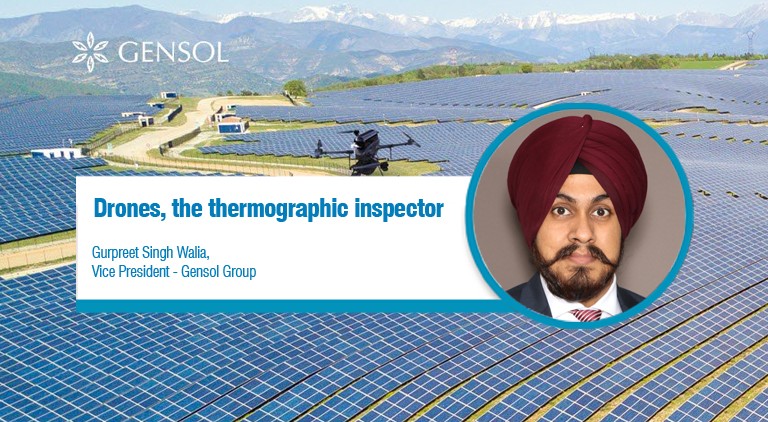Drones, the thermographic inspector
By EPR Magazine Editorial June 8, 2019 2:56 pm IST
By EPR Magazine Editorial June 8, 2019 2:56 pm IST

Stringent cost control, rigorous project schedule monitoring and good contract management keep any unanticipated overheads under check
Gurpreet Singh Walia, Vice President – Gensol Group
In an interaction with Athira Bejoy of EPR Magazine, Gurpreet Singh Walia, Vice President – Gensol Group, talks about their latest drone technology and shares how thermal imaging using drones implements 100 per cent plant inspection in much lesser time.
Gensol is said to be the lowest cost producer of energy. So, how does Gensol keep a low cost and at the same time maintain sustainability, too?
When we talk from the cost perspective, it depends a lot on supply chain efficiency and engineering optimisation. Gensol, being a consulting firm, comes from a background where we get to optimise even for the biggest clients in the county. This becomes possible because of a strict no-outsourcing policy and strong in-house design team with almost 50 engineers.
Design optimisation is the first stage and usually a sensitive one where we are not supposed to breach the fine line between optimisation and under-design. Vendor relations and evaluation are crucial to achieve this. Second stage is a zero inventory model, which comes from efficient procurement practice of ‘just in time’. Materials are supplied only when they are required and are directly installed.
Stringent cost control, rigorous project schedule monitoring and good contract management are also important to keep any unanticipated overheads under check. I would say, these were the main contributing factors which have caused a great reduction in cost.’
What prompted the idea to fly drones at solar plants?
Solar projects in our country are typically installed in a last moment rush, thereby increasing the chances of poor workmanship, especially with reference to installation of solar PV modules. Twisting and bending of these fragile panels can lead to micro cracks and eventually lead to hotspots and failure of the panel. Also, accelerated degradation of solar cell used to make PV panels can also lead to lower returns than expected.
Many other conditions apart from the above lead to a pressing need of rigorous operation and maintenance. Thermographic inspection is a mandatory part of typical O&M contracts and doing this activity manually is a herculean task. Hence, many choose to do such inspections on sampling basis, which might not always give a correct picture, especially when the sample is not selected intelligently.
Here, drones plug the gap by doing 100 per cent plant inspection in much lesser time and automatically generating a report. Such thermographic inspection cycles can then be done even on a half yearly or quarterly basis instead of a conventional manual exercise every year.
Can you please tell us a bit about working of these drones and what kind of technological base do they have?
How many drone registrations have been done till date? What kind of investment is done?What has been your company’s cumulative service offering in India till date?
Gensol has a comprehensible understanding of solar and the nuances it brings along. We provide our partners best advice at every stage of solar business to ensure it is worthwhile and profitable.
Having successfully delivered 240 projects with a spectacular portfolio of 18,896 MW, and an accomplished team of 160 advisors, Gensol provides solar advisory services that include design engineering and review, lender’s engineer services, owner’s engineers, project management services, and strategic and policy advisory for policy makers, project owners, lenders and EPC players. Gensol’s EPC vertical has successfully raised some robust solar projects on roofs as well as land, aggregating to 188+ MW across 178+ projects in India.
What are your upcoming projects?
We continue to serve our existing clients in India with current service offerings and expanding rapidly in international geographies. We continue to expand in niche segments also like floating solar, airports, energy storage and performance enhancement.
Upcoming ventures by Gensol Group are Blu Smart, which is a multi-modal 100 per cent electric mobility service provider currently active in Delhi NCR region, and Gensol Industries, which is a manufacturing facility for Industry 4.0 ready electrical switchgear panels.
We use cookies to personalize your experience. By continuing to visit this website you agree to our Terms & Conditions, Privacy Policy and Cookie Policy.